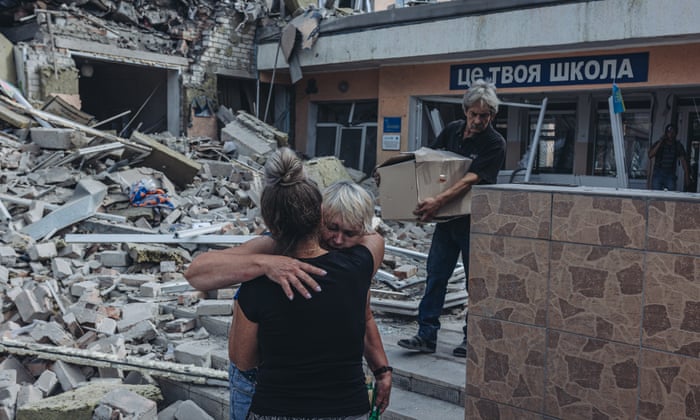Key events
The head of Russia’s investigative committee said Moscow had charged 92 members of Ukrainian armed forces with crimes against humanity and proposed an international tribunal backed by countries including Bolivia, Iran and Syria.
The government’s Rossiiskaya Gazeta on Monday quoted committee head Alexander Bastrykin as accusing “more than 220 persons, including representatives of the high command of the armed forces of Ukraine, as well as commanders of military units that shelled the civilian population”.
The Ukrainians were involved in “crimes against the peace and security of humanity, which have no statute of limitations”, he said. Bastrykin, whose committee investigates major crimes, said 92 commanders and their subordinates had been charged, and 96 people, including 51 armed forces commanders, declared wanted.
Reuters could not independently verify the committee’s allegations. Ukrainian authorities were not immediately available for comment.
Bastrykin was asked about his committee’s investigations into Ukrainian security forces’ actions in the self-declared people’s republics of Donetsk and Luhansk, separatist, Moscow-backed territories in Ukraine’s east, and whether investigations could take place under UN auspices.
Given that the “collective west” openly backed Ukraine, he said it would be more appropriate to work with Russian partners in the Commonwealth of Independent States, the Collective Security Treaty Organization, the BRICS group and the Shanghai Cooperation Organization.
It was “expedient” to involve countries with an independent position on Ukraine, “in particular, Syria, Iran and Bolivia”, he added.
Bastrykin said 1,300 criminal investigations had been initiated into members of Ukraine’s military, political leadership, radical nationalist associations, and armed formations, with more than 400 people so far held accountable.
The UK’s Ministry of Defence has issued its intelligence briefing on the position in Ukraine. It claims:
Inconclusive fighting continues in both the Donbas and Kherson sectors. Russian commanders continue to face a dilemma; whether to resource the offensive in the east, or to bolster the defence in the west.
Germany is back on course to meet its target of 75% gas storage levels by 1 September, according to Klaus Mueller, who is head of the Bundesnetzagentur gas regulator.
Reuters reports he said that there were decent gas injection levels and gas importer Uniper had ended withdrawals from storage.
Ukraine claims it will recapture Kherson by September
Ukrainian military officials have claimed a “turning point” in the battle to retake the southern region of Kherson, saying they will use western weapons to liberate by September the first major city captured by Russian forces.
Sergiy Khlan, an aide to the administrative head of the Kherson region, said in an interview with Ukrainian television on Sunday: “We can say that a turning point has occurred on the battlefield. We are switching from defensive to counteroffensive actions.”
“We can say that the Kherson region will definitely be liberated by September, and all the occupiers’ plans will fail,” he added.
Helped by deliveries of western-supplied long-range artillery, Ukrainian forces have been clawing back territory in the southern Kherson region in recent weeks, adding to suggestions that its troops are edging closer to a long-promised counteroffensive.
President Volodymyr Zelenskiy endorsed claims of a successful counteroffensive during his national address on Saturday, saying Ukrainian forces were moving “step by step” into the city.
Kherson was occupied by the Russian army on 3 March, the first major Ukrainian city captured by Russian forces since 24 February.
Ukrainian officials believe that Russian troops were able to take the city in part because Ukrainian security service agents failed to blow up the Antonivskyi bridge that crosses the Dnipro river, allowing troops to enter the city.
However, an increase in strikes in recent days against key Russian weapons stores and logistics around the southern city has prompted Ukraine’s military to claim its forces have moved within range of Russian targets.
Russia rallies support in Africa

Jon Henley
Russian foreign minister, Sergei Lavrov, has embarked on a four-day tour of several countries in Africa.
< p class="dcr-xry7m2">On his first stop in Egypt he sought to reassure his counterpart Sameh Shoukry that Russian grain supplies would continue and met with the secretary-general of the League of Arab States, Ahmed Aboul Gheit, where he spoke of deepening cooperation between Russia and the Arab League.
Lavrov reassured Egypt over Russian grain supplies, amid uncertainty over the future of a deal to resume Ukrainian exports via the Black Sea.
Egypt, one of the world’s top wheat importers, bought 80% of its wheat from Russia and Ukraine last year, and has been torn between ties to Moscow and its close relationship to the west.
“We confirmed the commitment of Russian exporters of cereal products to meet their orders in full,” Lavrov said in Cairo after talks with his Egyptian counterpart, Sameh Shoukry. “We discussed … cooperation in this area, agreed on further contacts, and have a common understanding of the causes of the grain crisis.”
Lavrov’s tour, which will also take in Uganda, Ethiopia and Congo, is aimed essentially at rallying African nations to Russia’s side. In an article published in four African papers, he rejected accusations that Russia was responsible for the food crisis.
He hailed what he called “an independent path” taken by African countries in refusing to join western sanctions against Russia and the “undisguised attempts of the US and their European satellites to gain the upper hand and impose a unipolar world order”.
Late on Sunday night Lavrov flew to the Republic of the Congo.
Moscow speaks of ‘new era’ with Arab League
Russia’s foreign minister, Sergei Lavrov, met with the permanent representatives of the member countries of the Arab League, promising officials the beginning of a “new era”.
“We are at the beginning of a new era, which would be a movement towards real multilateralism, not the one which the west tries to impose,” Russia’s foreign ministry quoted Lavrov as saying.
Ukraine warns Russian airstrikes will
stall grain deal

Jon Henley
Ukraine earlier warned that grain exports would not restart as hoped after the signing of a landmark deal aimed at easing the food crisis if a Russian airstrike on a key port on Saturday was a sign of things to come.
The attack on Odesa, which the Ukrainian president, Volodymyr Zelenskiy, denounced as “barbarism” and as a sign that Moscow could not be trusted to implement the freshly inked deal, drew international condemnation.
Turkey, which helped broker the accord allowing exports to resume, said immediately after the double cruise missile hits on the strategic southern port that it had received assurances from Moscow that Russian forces were not responsible.
But Russia’s defence ministry said on Sunday the strikes had destroyed a naval vessel and arms delivered by Washington. Kyiv said two Kalibr missiles fired from Russian warships hit an area around a pumping station and that two more were shot down.
The strike, which Ukrainian armed forces said did not hit the port’s grain storage area or cause significant damage, cast grave doubts on the future of the deal, which allows Ukrainian grain ships to navigate safe corridors that avoid known mines in the Black Sea and was hailed on Friday as a diplomatic breakthrough.
Kyiv said preparations to restore grain shipments to their prewar levels of 5m tonnes a month were continuing, but Zelenskiy’s economic adviser, Oleg Ustenko, warned on Sunday that the airstrike “indicates it will definitely not work like that”.
Ustenko told Ukrainian television that Ukraine had the capacity to export 60m tonnes of grain over the next nine months, but it would take up to 24 months if its ports could not function properly.
Summary and welcome
Hello and welcome back to the Guardian’s live coverage of the war in Ukraine.
I’m Samantha Lock and I will be bringing you all the latest developments for the next short while.
It is 8am in Kyiv and here is where things stand:
- Ukraine predicts that it will recapture the southern region of Kherson by September. Sergiy Khlan, an aide to the head of Kherson region, said in an interview with Ukrainian television: “We can say that the Kherson region will definitely be liberated by September, and all the occupiers’ plans will fail.” President Volodymyr Zelenskiy also said Ukrainian forces were moving “step by step” into Kherson. However, other reports suggest Ukrainian soldiers are doing well just to hold the frontline in nearby villages.
- Ukraine has warned that a deal to export grain via the Black Sea will stall if there are further Russian airstrikes on key ports. Zelenskiy’s economic adviser, Oleh Ustenko, told Ukrainian television: “Yesterday’s strike indicates that it will definitely not work like that.” The caution comes after Saturday’s missile attack in Odesa where Moscow insisted it only hit a Ukrainian warship and US-supplied Harpoon anti-ship missiles.
- The Russian foreign minister, Sergei Lavrov, has embarked on a tour of several countries in Africa. On his first stop in Egypt he sought to reassure his counterpart Sameh Shoukry that Russian grain supplies would continue, and met with the secretary general of the League of Arab States, Ahmed Aboul Gheit, where he spoke of deepening cooperation between Russia and the Arab League. Late on Sunday night he flew to the Democratic Republic of the Congo.
- Ukraine will continue doing all it can to inflict as much damage on Russian forces as possible and will not be cowed, Volodymyr Zelenskiy has vowed. “Even the occupiers admit we will win,” he said in his nightly video address on Sunday. “We do everything to inflict the highest possible damage on the enemy … we will celebrate against all odds. Because Ukrainians won’t be cowed.”
- The German president, Frank-Walter Steinmeier, has said Russia’s war against Ukraine is also a “war against the unity of Europe”. “We must not let ourselves be divided, we must not let the great work of a united Europe that we have begun so promisingly be destroyed,” he said in a speech in the western German city of Paderborn. “This war is not just about the territory of Ukraine, it is about the double shared foundation of our values and our order of peace.”
- Nearly half a million Ukrainian children are going to school in the European Union, according to the European Commission’s department of migration and home affairs. A total of 492,647 Ukrainian children had been integrated into the national school systems of the European Union, the department said.
- Ukraine’s health ministry has said that least 18 medical personnel have been killed and nearly 900 medical facilities damaged or destroyed by Russia’s invasion of Ukraine. The ministry said more than 50 medical workers had been wounded by Russian attacks and 123 medical facilities in Ukraine were totally destroyed by the invasion, while another 746 needed repairs.
- A Canadian citizen has died in Ukraine, Canada’s foreign ministry confirmed. Media reports suggested the Canadian was with two US citizens who recently died in the Donbas region of eastern Ukraine. The US and Canadian governments have not given details on how recent the deaths were, or their circumstances.

